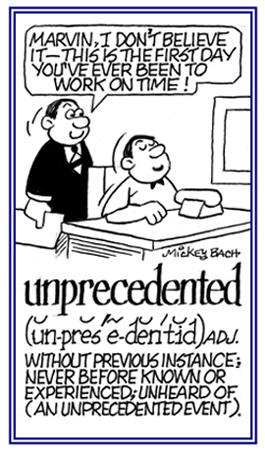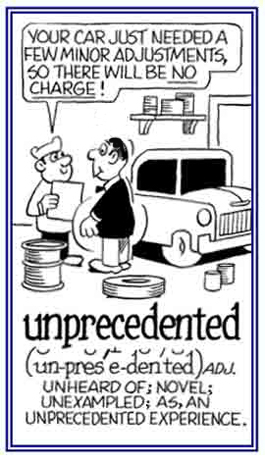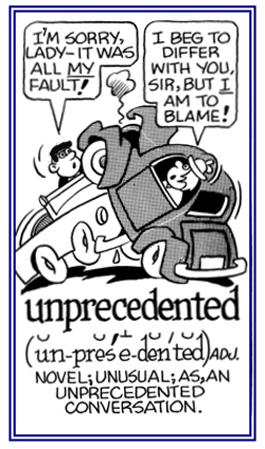-cede, -ceed, -cess, -cease
(Latin: to be in motion; to go, to go away, to yield, to give up, to withdraw)
1. A sequence of people or things coming one after the other in time: The school children entered the school building in succession, one little group following the next one that just got off the school bus.
2. The following of one thing after another: Yesterday, the school's baseball team had five wins in succession.
3. The right to take up a position or title: In many countries there is a long history of successions to the throne to be king or queen, depending on the relationship of the members in the royal family.
4. The series of changes that create a full-fledged plant and animal community; for example, from the colonization of bare ground to the establishment of a forest: The biological succession in nature can be seen when a forest fire destroys the trees and vegetation in an area, which is then followed by new plants securing their former living conditions, followed again by more plants and animals, until life continues as it was before the fire.
5. Etymology: from Old French succession, from Latin successionem, successio, "a following after, a coming into another's place, a result"; from successus, past participle of succedere, "to come after, to go near to", from sub, "next to, after" + cedere, "to go, to move".
2. The following of one thing after another: Yesterday, the school's baseball team had five wins in succession.
3. The right to take up a position or title: In many countries there is a long history of successions to the throne to be king or queen, depending on the relationship of the members in the royal family.
4. The series of changes that create a full-fledged plant and animal community; for example, from the colonization of bare ground to the establishment of a forest: The biological succession in nature can be seen when a forest fire destroys the trees and vegetation in an area, which is then followed by new plants securing their former living conditions, followed again by more plants and animals, until life continues as it was before the fire.
5. Etymology: from Old French succession, from Latin successionem, successio, "a following after, a coming into another's place, a result"; from successus, past participle of succedere, "to come after, to go near to", from sub, "next to, after" + cedere, "to go, to move".
successive
Following in an uninterrupted sequence; consecutive.
successively
In proper order or sequence.
Succesus per educationem.
Success through education.
Motto of Thomas Nelson Community College, Hampton, Virginia, USA.
supercede
A misspelling of supersede.
supersede (verb), supersedes; superseded; superseding
1. To replace in power, authority, effectiveness, acceptance, use, etc., as by another person or thing: Ted's supervisor retired and was superseded by another qualified administrator.
2. To set aside or to cause to be set aside as void, useless, or obsolete, usually in favor of something else: Sam superseded his old car with a new one.
3. To cause to be set aside; especially, to displace someone or something as inferior or too old: The new edition of the scientific publication was set up to supersede its original magazines.

© ALL rights are reserved.
Go to this Word A Day Revisited Index
2. To set aside or to cause to be set aside as void, useless, or obsolete, usually in favor of something else: Sam superseded his old car with a new one.
3. To cause to be set aside; especially, to displace someone or something as inferior or too old: The new edition of the scientific publication was set up to supersede its original magazines.
No sooner does a person buy a computer than the company brings out a new one that is superseding it.
4. Etymology: from Latin supersedere, literally, "to sit over or above" or "to sit on top of" something; from super, "above" + sedere, "to sit".
Go to this Word A Day Revisited Index
so you can see more of Mickey Bach's cartoons.
The act of replacing one person or thing by another one; especially, someone, or something, held to be superior.
surcease (verb), surceases; surceased; surceasing
1. To stop or to bring something to an end: The neighbors were hoping that the noise from the late outdoor musical would surcease so they could get some sleep.
2. Etymology: from Anglo-French surseser; from Old French sursis, past participle of surseoir, "to refrain, to delay"; from Latin supersedere, "to sit on top of, to stay clear of, to abstain from, to forbear, to refrain from"; from super, "above" + sedere, "to sit".
2. Etymology: from Anglo-French surseser; from Old French sursis, past participle of surseoir, "to refrain, to delay"; from Latin supersedere, "to sit on top of, to stay clear of, to abstain from, to forbear, to refrain from"; from super, "above" + sedere, "to sit".
unacceptable (adjective), more unacceptable, most unacceptable
Liable to be disapproved of and not pleasing or welcome: Jack's behavior in school was so unacceptable, that he was not only sent to the principal's office, but was sent home immediately.
Floyd's handwriting was so unacceptable that Mrs. Thompson couldn't decipher it, so he had to do his homework again under his teacher's supervision.
To repeat something; such as, facts, ideas, etc. without understanding them or explaining them: The speaker memorized the historical scientific names making unacceptable regurgitations of them during his speech; in other words, the he was just throwing out facts and figures without any relevant explanations or interconnections.
unaccessible
unceasing
1. Continuing without stopping, pausing, or diminishing.
2. Continuing forever or indefinitely.
2. Continuing forever or indefinitely.
unceasingly
1. Without ceasing, or stopping; continuously.
2. Without intermission or cessation.
2. Without intermission or cessation.
unprecedented (adjective) (not comparable)
1. A reference to a matter or circumstance that has no earlier parallel or equivalent: One terrible feature of the Holocaust was the unprecedented genocide of millions of people in the "death camps" of Germany.
2. Relating to something that has never been seen, done, or experienced before: The unprecedented decision that the Jackson family made was to go on vacation in the Alps, a place they had never visited previously.
3. Descriptive of the greatest in size, amount, degree, etc. that has ever been known: According to the news, the flood waters in some countries have risen to unprecedented levels.
4. Etymology: un-, "not" + precedent, "experienced" + -ed, "past tense".

© ALL rights are reserved.

© ALL rights are reserved.

© ALL rights are reserved.
Go to this Word A Day Revisited Index
2. Relating to something that has never been seen, done, or experienced before: The unprecedented decision that the Jackson family made was to go on vacation in the Alps, a place they had never visited previously.
3. Descriptive of the greatest in size, amount, degree, etc. that has ever been known: According to the news, the flood waters in some countries have risen to unprecedented levels.
4. Etymology: un-, "not" + precedent, "experienced" + -ed, "past tense".



Go to this Word A Day Revisited Index
so you can see more of Mickey Bach's cartoons.
unsuccessful
1. Not resulting in success or turning out favorably.
2. Not achieving an intended objective or goal.
3. Not having achieved or gained wealth, fame, or power.
2. Not achieving an intended objective or goal.
3. Not having achieved or gained wealth, fame, or power.


